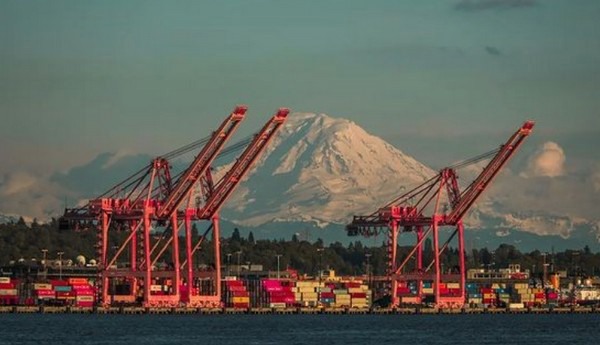Following the tentative agreement between the International Longshore and Warehouse Union (ILWU) and Pacific Maritime Association (PMA), the produce industry is feeling a sense of relief.
“This is a good thing for us,” says Todd Fryhover, president of the Washington Apple Commission. “We need stability in the export market and working through the ports is critical to our growers’ benefit. We export somewhere between 25-30 percent of our product so having that labor contract in place provides us with the opportunity to support our customers in our overseas markets.”
The agreement is a new six-year contract covering workers at all 29 West Coast ports. Negotiations between the ILWU and PMA began in May 2022 regarding their contract which expired two months later. Details of the agreement have not been released and it is subject to ratification by both parties.
 The agreement is a new six-year contract covering workers at all 29 West Coast ports.
The agreement is a new six-year contract covering workers at all 29 West Coast ports.
Slowdowns and more
Earlier this week, it was reported that the ILWU had continued to stage work actions at the Port of Seattle that led to containerized terminal operations coming to a halt. “In some cases, the Union slowed down operations, resulting in longshore workers being sent home. On another shift, the Union failed to dispatch longshore workers which effectively shut down the port,” said the PMA at the time. Reports indicated that because of the slowdowns and stoppages last week, an estimated $5.2 billion of trade was floating off the Ports of Los Angeles, Long Beach and Oakland.
That said, Fryhover says there were only minimal effects from the job action. “The impacts of COVID are still around as far as container availability and things of that nature but up until last week, we have had very little impact by lack of a contract,” he says. “We were in the Port of Tacoma last week and they had just started experiencing some slowdown. That was the first time that we potentially had any impact.”
The bigger concern from apple growers and shippers was whether this issue would be resolved prior to the beginning of the new apple export season. “We’re probably 75 percent the way through the majority of our export season on apples. What’s left is primarily going to go to Canada and Mexico so there wouldn’t have been a lot of impact in June, July and August,” says Fryhover.
 The bigger concern from apple growers and shippers was whether this issue would be resolved prior to the beginning of the new apple export season.
The bigger concern from apple growers and shippers was whether this issue would be resolved prior to the beginning of the new apple export season.
Familiar concerns
After all, growers and shippers had been through this very experience in 2015. “It was a nightmare of all scenarios coming together. We had the largest crop in history and then we had port slowdowns and a lack of a contract and that was remembered,” said Fryhover. “So when we heard there wasn’t a contract in place, there was definitely a concern. We’re very happy to hear that there’s at least a tentative agreement and hopefully, it will turn into a real contract and then we’ll have a return to normal export opportunities.”
Meanwhile, the Port of Oakland is also applauding the tentative agreement. “Today is a monumental day for U.S. West Coast seaports. Labor peace is a commitment to continue delivering the most efficient, cost-effective, and environmentally-sustainable cargo operations in the country. Asia to the West Coast still remains the most efficient route," said Port of Oakland executive director Danny Wan in a press release. "We thank Acting Secretary Labor Secretary Julie Su for her key role in the negotiations.”
The release says that the Port of Oakland has been diligently working with tenants and maritime partners globally to return diverted cargo back to the West Coast in an effort to continue growing local jobs. More than 84,000 regional jobs rely on the Port of Oakland.
For more information:
Pacific Maritime Association
https://www.pmanet.org/
International Longshore and Warehouse Union
https://www.ilwu.org/
Washington Apple Commission
https://waapple.org/
Port of Oakland
https://www.portofoakland.com/
